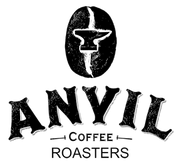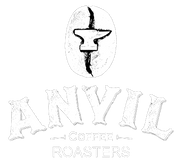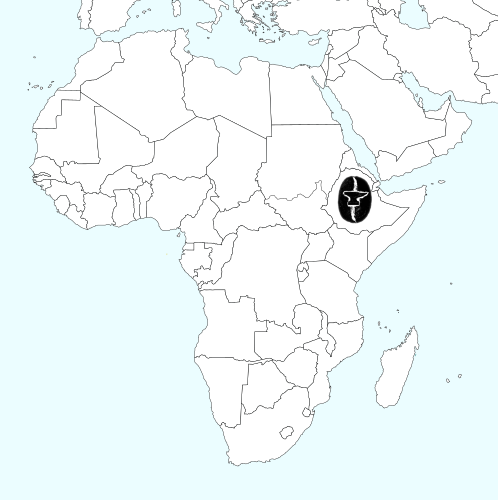
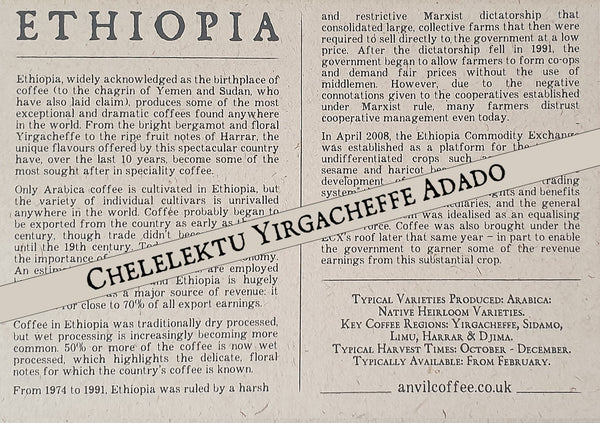
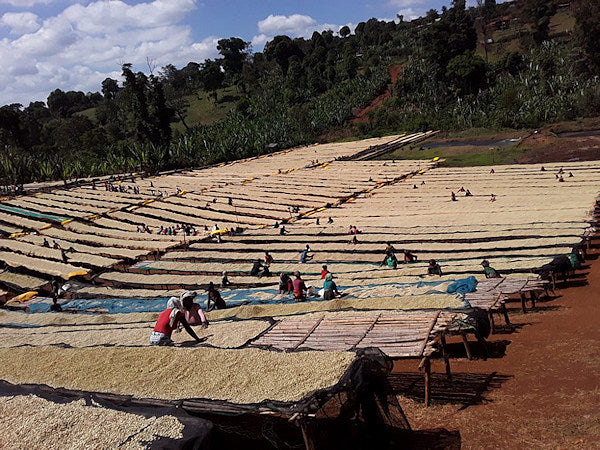
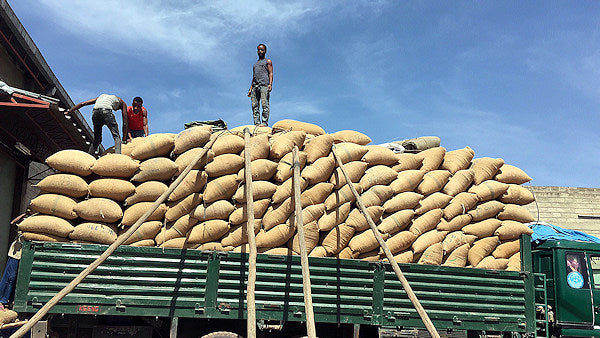
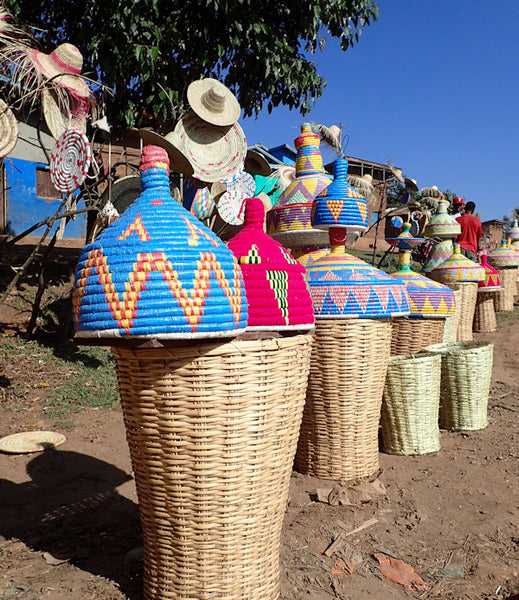
ANVIL Ethiopian Yiragacheffe Adado - Fully Washed - Micro lot
Ethiopia – Yirgachefe Adado - Fully Washed - Direct Trade Coffee Beans - Micro Lot - LIMITED AVAILABILITY
(If you would like your beans ground, please let us know which grind you require)
|
Washing Station |
Legu Trading |
|
Varietal(s): |
Local Landraces & JARC 74 selections |
|
Processing: |
Fully washed |
|
Altitude: |
1,800 to 2,000 metres above sea level |
|
Owner: |
Approx.1,500 small coffee growers |
|
Town: |
Bulle district, Adado localities |
|
Region: |
Southern State, Gedeo |
|
Country: |
Ethiopia |
|
Total size of farm: |
<1 hectare |
This exceptional green bean was grown by smallholder farmers living around the town of Adado in Gedeo County, Yirgacheffe region.
Most contributing farmers own less than a hectare of land, and they grow coffee simply as a backyard cash crop.
Coffee will usually be interspersed with other subsistence crops, such as sweet potato, mangos and avocados.
Income from coffee is important but minimal for most farmers due to the small size of their farms. As such, inputs are minimal – most coffee grown in the region is 100% organic, though not certified, as farmers simply don’t have the money to apply chemical fertilisers, pesticides or herbicides.
Legu Trading tries to help with this situation by offering a premium price and by hiring as many individuals as possible in their mills and facilities. The company hires at least 300 people year round and up to 600 in the high season. All workers are paid a fair wage and receive full, 8 hour work days.
Coffee is selectively hand-picked before being delivered to collection points, usually within 10 km of the producer’s homes. Great care is taken upon delivery to separate out any over-ripe, under-ripe or damaged beans before consolidating with other lots for the road to the wet mill.
At least once a day, the collected coffee cherry is delivered to the mill, where it is pulped and then delivered to a fermentation tank, where it ferments for 12-18 hours depending on the climate at the time. After fermentation the coffee is fully washed through grading channels and is then delivered to dry on African beds. Once here, the parchment is turned regularly and protected from hot sun until it reaches the optimal humidity, at which point it is bagged and rested.
Varieties of coffee grown here are traditionally referred to as ‘heirloom’ by exporters – a catchall terminology which often masks the wide assortment of varieties that may be present within various regions…even, within farms. Many of these varieties will have been developed by Ethiopia’s Jimma Agricultural Resarch Centre (JARC), which, since the late 1960s, has worked to develop resistant and tasty varieties for the Ethiopian coffee industry and also to provide the agricultural extension training needed to cultivate them. The dual factors of Ethiopian Commodity Exchange (ECX) forced anonymisation of lots (see below) combined with the relatively low awareness of formal variety names outside Ethiopia has meant that the JARC’s work has historically been under-recognised by specialty importers and roasters, but a new book issued by Counter Culture Coffee in the USA (2018/19) has drawn new attention to the topic, and rightly so.
About the Yirgacheffe region
Yirgacheffe is actually part of the Sidamo region in southern Ethiopia, but its exquisite washed coffees are so well known that is has been sub-divided into its own micro-region. This steep, green area is both fertile and high – much of the coffee grows at 2,000m and above.
At first glance Yirgacheffe’s hills look thickly forested - but in fact it is a heavily populated region and the hills are dotted with many dwellings and villages, growing what is known as ‘garden coffee’. There are approximately 26 cooperatives in the region, representing some 43,794 farmers and around 62,004 hectares of garden coffee. The production is predominantly washed, although a smaller amount of sundried coffees also come out of Yirgacheffe.
Around 85 percent of Ethiopians still live rurally and make a living from agriculture; each family usually lives in a modest home (often a single round mud hut) and farms their own plot of land, where they grow both cash crops and food for their own consumption.
In Yirgacheffe, coffee is one of the main cash crops – covering from half a hectare to 1.5 hectares (the latter is considered big). This is usually planted alongside a second cash crop – often a large-leafed tree used in making roofs for (and also shade provider for the coffee) known as 'false banana'. This looks like a banana tree but isn't - instead its thick stem is used to produce both a nutritious flour and a fermented paste that are staple ingredients (particularly across southern Ethiopia).
There is only one main harvest a year in Ethiopia - this usually takes place in November and December across all of the country's growing regions. There are, on average, 4 passes made during the harvest period, and, in regions that produce both washed and naturals, the last pass is used for the natural coffee. Washed coffees are then generally pulped on the same day that they are picked (usually in the evening/night), sorted into three grades by weight (heavy, medium and floaters), fermented (times vary - usually between 16 and 48 hours), washed and then usually graded again in the washing channels. The beans are then dried on African beds, where they are hand-sorted, usually by women.
---
Please note, because we have a limited quantity of these green beans and we allow bespoke orders in different weights, we are unable to allocate stock to this item, therefore, if we run out of stock at around the time you place your order, we will give you the choice of choosing an alternative, or receiving a full refund - apologies in advance if this happens - we will remove this product as soon as we are able after it's all gone.
